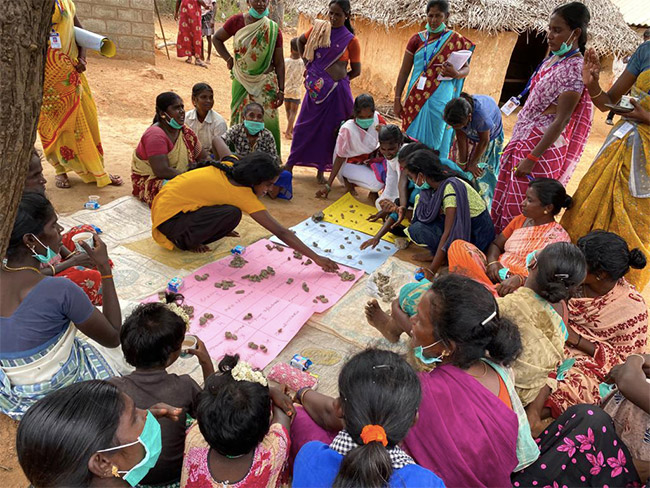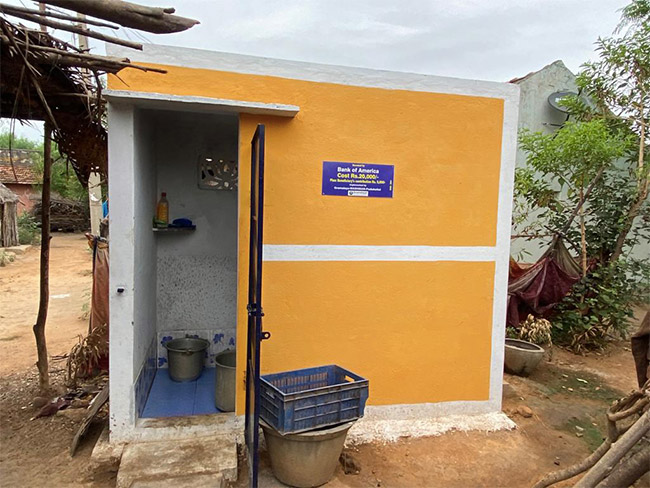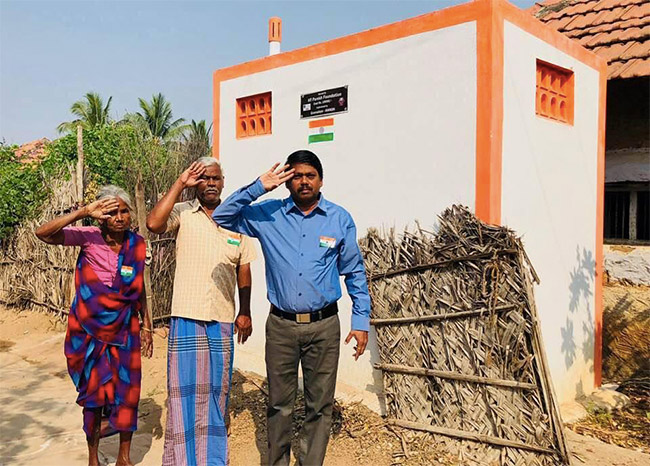Highlights
- Mr. Damodaran has helped in constructing toilets in 500 schools
- Gramalaya started with an aim to help the poor in accessing WASH facilities
- Mr. Damodaran involves community leaders to promote sanitation
New Delhi: Almost 37 years ago, when a 20-year-old S. Damodaran, a resident of Tiruchirappalli (Trichy), Tamil Nadu joined the National Service Scheme (NSS) in his college in Trichy and started visiting the nearby rural areas, he did not imagine how those trips to the villages would change his life and aspirations forever. The dire lack of access to safe drinking water, sanitation facilities and awareness about the importance of hygiene and cleanliness provoked Mr. Damodaran to act and bring about change. He founded a non-governmental organisation called Gramalaya after two years of field research, in 1987. Today, at the age of 57, Mr. Damodaran proudly boasts of dedicating over three decades of his life to ensuring access to WASH (Water, Sanitation and Hygiene) to people living in over 600 villages and 200 urban slums across the Southern states of Tamil Nadu, Karnataka, Andhra Pradesh, Telangana, Kerala and one Union Territory of Puducherry. Mr. Damodaran has been conferred the Padma Shri Award 2022 for his work towards sanitation in villages and urban slums across South India.
During his three and a half decades of work, Mr. Damodaran has managed to build over 6 lakh individual household toilets and 500 school toilets through Gramalaya, impacting the sanitation habits of more than 30 lakh people in South India. While talking to NDTV, Mr. Damodaran said,
We started by providing hand pumps to the communities in villages in South Inda. We soon realised that even after having a water source at home, people were not washing their hands and lacked knowledge about the importance of handwashing. So we started conducting workshops to raise awareness about handwashing. Almost every household was practising open defecation during that time and so in 1989 we expanded our work and started building Individual Household Toilets in collaboration with local governments under the country’s first sanitation programme called Central Rural Sanitation Programme (CRSP) which was launched by the then Prime Minister Rajiv Gandhi in 1986. CRSP was similar to PM Narendra Modi’s Swachh Bharat Mission (SBM). It was the first of its kind to provide financial assistance to below poverty level (BPL) families for constructing individual household toilets. By 1990, we started covering slum in areas in Tamil Nadu and later in other states.
Due to these efforts of Mr. Damodaran and a dedicated team of volunteers and community leaders, Kalmandhai, a slum under Tiruchirappalli City Corporation became the first Open Defecation Free (ODF) slum in India in 2002. It was followed by declaring Thandavampatti village of Tiruchirappalli district as the country’s first ODF village, 2003. Over the next 15 years, Gramalaya helped more than 200 slum areas and over 300 villages in the South become ODF. The central government recognised the efforts of the NGO and in 2013, the Ministry of Drinking Water and Sanitation approved it as one of the national key resource centres for providing training on water and sanitation to government officials and NGOs in South India. On October 2, 2017, Mr. Damodaran received ‘Toilet Titan Award’ from the Vice-President M. Venkaiah Naidu in an award ceremony.
Mr. Damodaran asserted that initially, convincing people to build toilets in their home was a huge challenge. He said,
People were so used to defecating in the open fields, near rivers and ponds. This used to contaminate the water and air of the area, giving rise to diseases such as Cholera and Typhoid. Instances of stunting and cognitive impairment among children were also increasing but the people did not want to change their habit. They were not open to the idea of constructing toilets in their homes. This is because people tend to have certain myths and misconceptions about toilets. Therefore, it became necessary to bring about a behaviour change in people by educating them on developing good toilet habit and creating a demand for the toilet from their side itself. This is a continuous process. Along with constructing toilets, it is absolutely necessary to work on changing behaviours and developing habits through a number of IEC (Information, Education and Communication) activities.
In order to construct toilets in a village, the NGO conducts a survey to identify villages that have the lowest percentage of people with access to functioning toilet facilities. A team then visits those villages, meets with local people and goes to each household to collect details about their sanitation habits. Next, the organisation conducts village meetings by bringing the villagers to an open defecation site which is then used as a backdrop to talk about safe sanitation and the importance of having a toilet at home.
Toilet Is More Than Just A Four-Walled Structure, It Is A Way To A Healthy Life: Mr. Damodaran
While talking about the kind of toilets built by Gramalaya, Mr. Damodaran said,
We have built various types of cost-effective pit toilet models, mainly single or twin pit. But in the last ten years, we have focused on twin pit pour-flush latrines measuring 4 ft (feet) x 4 ft. Households often use a bucket to flush the toilet. We have now started focusing on building twin pit latrines with a bathroom area to bathe in and incinerator facility for disposal of soiled sanitary pads. We call it a SMART toilet, and it measures 4 ft x 8 ft. We have built over 60,000 of SMART toilets across the Southern states. The twin pit pour-flush toilet is a more sustainable kind among various other models of toilet. Once the first pit is full, you can use the second pit. It takes about five to seven years to fill up a pit, and by that time, the faecal sludge in the first pit will become completely dry, like sand. Also, it is cheaper than a septic tank and the disposal is easy. The important factor is that the kind of toilets built and technologies used, have to be area appropriate, cost-effective, replicable and sustainable.
Mahadevi, a resident of Uppiliyakudi village, Pudukkottai district, who is a daily wage labourer and formerly practised open defecation in nearby fields, shared how her life changed after she got a toilet at home. She said,
With two teenage daughters at home, fears about their safety was always there. I had it in my mind that I had to build a toilet, no matter what. Each day we used to walk about a kilometre with a mug in our hand, to find trees and bushes to hide and defecate. This used to be even more difficult and shameful during menstruation. The elderlies, pregnant women, and people with disabilities faced special challenges every day to perform the basic, most natural task of relieving themselves. Having access to toilets within our homes has helped us all in so many ways, thanks to Gramalaya.
According to Mr. Damodaran, for constructing toilets, Gramalaya receives financial support from various CSR (Corporate Social Responsibility) projects and from the local and state governments.
While talking about the evolution of sanitation in the country and how successful the sanitation programmes have been, Mr. Damodaran said,
I would like to focus on the positive picture here. Changing behaviour is not an easy feat but over the years, with focused messaging, the governments have been able to generate a demand for toilets from the community. It is a positive sign in itself. That being said, there is still a lack of awareness in a large number of people that needs to be addressed. Along with this, challenges like lack of resources or technical know-how have acted as barriers in the success of sanitation programmes. Constant monitoring is another aspect missing from sanitation programmes of the government.
He further said that monitoring is extremely important for maintaining the gains made during the execution of a project. He said,
Toilet built by us, even 20-30 years ago, under various government schemes are still under use and are in good conditions. We have involved the people of the community in the monitoring process in order to ensure that people continue using toilets.
While talking about the evil of manual scavenging, Mr. Damodaran asserted that in the rural areas and slums where Gramalaya works, the practise has almost come to an end. He said,
There are hardly any septic tank toilets in the places we work at and so there is no need for anyone to risk their lives by cleaning septic tanks and sewages. The state governments in South India are also focusing on eliminating manual scavenging and are spending a lot on rehabilitating the scavengers into various other means of livelihoods.
Also Read: A 72-Year-Old From Madurai Has A Solution To Tide Over The Crisis Of Clean Water
Going Beyond Toilet Construction
Beyond toilets, Gramalaya has been working on promoting Menstrual Hygiene Management (MHM) among women and girls in Southern states. During the last six years, the organisation has reached out to more than 8 lakh women and girls and helped them switch from unhygienic ways of managing their periods to using eco-friendly reusable cloth pads. Mr. Damodaran said,
In the villages where we have been working since the past few years, we have gone door-to-door to give people- both women and men- education of hygiene during menstruation.
In 2018, a ward in Musiri town became the country’s first urban area and in 2019, ATK Nagar village in Uppliyakudi panchayat became the rural area where 100 per cent of the menstruating women and girls are using cloth pads and are practising safe and plastic-free menstrual hygiene management.

So far, Gramalaya has reached out to more than 8 lakh women and girls in Southern states for raising awareness about Menstrual Hygiene Management (MHM)
Acknowledging the work of Mr. Damodaran and his organisation, Ms. Amuthavalli, City Engineer, Trichy City Corporation, said that the organisation has been instrumental in changing the sanitation scenario in Trichy which was ranked 39 among cities with population more than one lakh in the Swachh Survekshan 2019. She said,
We have done a number of toilet constructions, awareness generation and capacity building programmes over the past years with Gramalaya. The NGO has gained a good rapport with the people in both urban and rural areas which is very important when it comes to an intervention focusing on behaviour change. Not just toilet construction, Mr. Damodaran is also helping the city in faecal sludge management. He is doing good work and I look forward to continue working with him.
Gramalaya has also partnered with Reckitt’s Harpic World Toilet College initiative. As part of the collaboration, the organisation has been working in Tamil Nadu, Kerala, Andhra Pradesh states as an associate of the Harpic World Toilet College for training 3,000 sanitation workers. For the year 2022-2023, Gramalya will be taking forward the work of the Harpic World Toilet College in three more states – Telangana, Karnataka and Pondicherry, for upskilling 6,000 sanitation workers.
NDTV – Dettol Banega Swasth India campaign is an extension of the five-year-old Banega Swachh India initiative helmed by Campaign Ambassador Amitabh Bachchan. It aims to spread awareness about critical health issues facing the country. In wake of the current COVID-19 pandemic, the need for WASH (Water, Sanitation and Hygiene) is reaffirmed as handwashing is one of the ways to prevent Coronavirus infection and other diseases. The campaign highlights the importance of nutrition and healthcare for women and children to prevent maternal and child mortality, fight malnutrition, stunting, wasting, anaemia and disease prevention through vaccines. Importance of programmes like Public Distribution System (PDS), Mid-day Meal Scheme, POSHAN Abhiyan and the role of Aganwadis and ASHA workers are also covered. Only a Swachh or clean India where toilets are used and open defecation free (ODF) status achieved as part of the Swachh Bharat Abhiyan launched by Prime Minister Narendra Modi in 2014, can eradicate diseases like diahorrea and become a Swasth or healthy India. The campaign will continue to cover issues like air pollution, waste management, plastic ban, manual scavenging and sanitation workers and menstrual hygiene.
[corona_data_new]


























